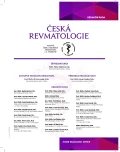-
Medical journals
- Career
Risk of liver damage during the treatment with tumor necrosis factor antagonists
Authors: O. Šléglová
Authors‘ workplace: Revmatologický ústav, Praha
Published in: Čes. Revmatol., 25, 2017, No. 4, p. 184-189.
Category: Review Article
Overview
Treatment with tumor necrosis factor antagonists can cause drug-induced liver damage. However, after a thorough analysis of detected cases and prospective studies aimed at monitoring liver damage, it can be concluded that the risk of severe hepatic damage is relatively low and treatment can therefore be considered as safe. Most authors emphasize the need for consistent monitoring of patients with early detection of potential hepatotoxicity. A multidisciplinary approach is recommended in further decision making. Some authors consider liver biopsy a key examination. However, standard recommendations for hepatic damage during treatment with tumor necrosis factor antagonists, including treatment recommendations, are lacking.
Key words:
Treatment with tumor necrosis factor alpha antagonists, liver toxicity, autoimmune rheumatic diseases
Sources
1. Germano V, Picchianti Diamanti A, Baccano G, et al. Autoimmune hepatitis associated with infliximab in a patient with rheumatoid arthritis. Ann Rheum Dis 2005; 64 : 1519–1520.
2. Harada K, Akai Y, Koyama S, et al. A case of autoimmune hepatitis exacerbated by the administration of etanercept in the patient with rheumatoid arthritis. Clin Rheumatol 2008; 27 : 1063–1066.
3. Ozorio G, McGarity B, Bak H, et al. Autoimmune hepatitis following infliximab therapy for ankylosing spondylitis. Med J Aust. 2007; 187 : 524–526.
4. Tobon GJ, Cañas C, Jaller JJ, et al. Serious liver disease induced by infliximab. Clin Rheumatol 2007; 26 : 578–581.
5. Ghabril M, Bonkovsky HL, Kum C, Davern T, Hayashi PH, et al. Liver injury from tumor necrosis factor-α antagonists: analysis of thirty-four cases. Clin Gastroenterol Hepatol 2013; 11 : 558–564.
6. Bjornsson ES, Gunnarsson BI, Grondal G, et al. Risk of drug-induced liver injury from tumor necrosis facror antagonists. Clin Gastroenterol Hepatol 2015; 13 : 602–608.
7. Rossi RE, Parisi I, Despott EJ, et al. Anti-tumour necrosis factor agent and liver injury: Literatury review, recommendations and management. World J Gastroenterol 2014; 20(46): 17352–17359.
8. Brodanova M. Toxické poškození jater – I. díl. Interní Med. 2002; 12 : 590–594.
9. Brodanova M. Toxické poškození jater – II. díl. Interní Med. 2003; 1 : 19–23.
10. Červený P. Polékové poškození jater. Prakt. lékáren. 2013; 9(3): 123–126.
11. Grant LM, Rockey DC. Drug - induced hepatotoxicity. N Eng J Med 2003; 349(5): 474–485.
12. Bjornsson ES, Talwalkar J, Treeprasertsuk S, et al. Drug-induced autoimmune hepatis: clinical characteristics and prognosis. Hepatology 2010; 51 : 2040–2048.
13. Danan G, Benichou C. Causality assessment of adverse reactions to drugs – I. A novel method based on the conclusions of international consensus meetings: application to drug-induced liver injuries. J Clin Epidemiol 1993; 46 : 1323–1330.
14. Kleiner DE, Chalasani NP, Lee WM, et al. Hepatic histological findings in suspected drug-induced liver injury: systemic evaluation and clinical associations. Hepatology 2014; 59 : 661–670.
15. Hennes EM, Zeniya M, Czaja AJ, et al. Simplified criteria for the diagnosis of autoimmune hepatitis. Hepatology 2008; 48 : 169–176.
16. Vergani D, Mieli-Vergani G. Autoimmune hepatitis. Autoimmun Rev 2003; 2 : 241-247.
17. Lammert C, Einarsson S, Niklasson A, et al. Relationship between daily dose of oral medications and idiosyncratic druginduced liver injury(DILI). Search for signals. Hepatology 2008; 47 : 2003–2009.
18. Thiefin G, Morelet A, Heurgue A, et al. Infliximab-induced hepatitis: absence of cross-toxicity with etanercept. Joint Bone Spine 2008; 75 : 737–739.
19. Carlsen KM, Riis L, Madsen OR. Toxic hepatitis induced by infliximab an a patient with rheumatoid arthritis with no relapse after switching to eranercept. Clin Rheumatol 2009; 28 : 1001–1003.
20. Miehsler W, Dejaco C, Petritsch W, et al. A decade of infliximab: The Austrian evidence based consensus on the safe of use of infliximab in inflammatory bowel disease. J Crohn Colitis 2010; 4 : 221–256.
21. Mancini S, Amorotti E, Vecchio S, et al. Infliximab-related hepatis: discussion of a case and review of the literature. Intern Emerg Med 2010; 5 : 193–200.
22. Fontana RJ, Seeff LB, Andrade RJ, et al. Standardization of nomenclature and causalita assessment in drug-induced liver injury: summary of a clinical research workshop. Hepatology 2010; 52 : 730–742.
23. Chalasani N, Fontana RJ, Bonkovsky HL, et al. Causes, clinical features, and outcomes from a prospective study of drug-induced liver injury in the United States. Gastroenterology 2008; 135 : 1924–1934.
Labels
Dermatology & STDs Paediatric rheumatology Physiotherapist, university degree Internal medicine Cardiology Orthopaedics Rheumatology
Article was published inCzech Rheumatology

2017 Issue 4-
All articles in this issue
- Atherosclerosis and cardiovascular risk in patients with systemic sclerosis
- Joint inflammation and microbes in scale from microbiome to septic arthritis
- Overlap of the symptoms of thrombotic thrombocytopenic purpura and antiphospholipid syndrome in a patient with juvenile systemic lupus erythematosus – case report
- Risk of liver damage during the treatment with tumor necrosis factor antagonists
- Czech Rheumatology
- Journal archive
- Current issue
- Online only
- About the journal
Most read in this issue- Joint inflammation and microbes in scale from microbiome to septic arthritis
- Atherosclerosis and cardiovascular risk in patients with systemic sclerosis
- Risk of liver damage during the treatment with tumor necrosis factor antagonists
- Overlap of the symptoms of thrombotic thrombocytopenic purpura and antiphospholipid syndrome in a patient with juvenile systemic lupus erythematosus – case report
Login#ADS_BOTTOM_SCRIPTS#Forgotten passwordEnter the email address that you registered with. We will send you instructions on how to set a new password.
- Career

